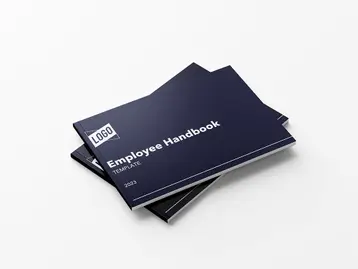
Table of contents
- 1.Why hygiene is important
- 2.Remote workers should have good hygiene too
- 3.Having the conversation about poor hygiene
- 4.Understand how the employee feels
- 5.Offer solutions
- 6.Follow-up
- 7.Are there hygiene exemptions?
- 8.Allowing hygiene accommodations
- 9.Amend (or adopt) a dress code policy
HR professionals have many rewarding aspects of their job. They get to hire people and start them on what will hopefully be a happy and prosperous career trajectory, they support training and development to grow employees in their role with the company and professionally, and they source and negotiate perks and benefits that enrich the lives of staff members and their families. There are so many gratifying features to the work it’s not surprising "people people" gravitate toward the field. Unfortunately, there’s always a yin to the yang: HR is typically tasked with terminations and other news that’s not going to make someone’s day. While many of these duties are one-and-done, addressing an employee who has poor hygiene takes discomfort to a new level. Not only do you have to have the discussion, but you also have to face that person (and they you), for the remainder of their tenure with the company. It’s a difficult conversation to have, but not impossible, and certainly not one that should be avoided.
Why hygiene is important
Your brand may be low-key, but there’s only so low you should go. Whether you require three-piece suits or one step up from pajamas, work is a professional environment. Dress codes may be relaxed, but hygiene should never be. First impressions do matter: the message you send to coworkers and customers informs how they view and respond to you. The message of poor hygiene: self-care is not a priority, nor is the discomfort it creates for others. If coworkers and customers are avoiding interaction with the offending employee, they cannot be effective in their role. If the running joke in the office is Spot the Stain on Sean, no one is taking that staff member seriously. The ripple effect will waft throughout the organization. The impact on a daily and long-term basis can be significant.
Remote workers should have good hygiene too
You may not be able to smell it, but when an employee is visibly unhygienic, with soiled clothes, teeth, and hair, every online call is uncomfortable. It’s impossible for others to focus on the task at hand with Pigpen on the call. We’ve all had the occasional bit of broccoli stuck in our teeth as we mindlessly smile and chat our way through social humiliation. If we’re lucky, a friend will discretely let us know a good floss is necessary. But when mustache and beard food is the norm, rather than the exception, it’s time for a conversation. While the pandemic has changed some employee behavior for the better, hygiene may not have gotten the memo. Everyone’s slacked off a bit when working from home, but hygiene is still important. You may want to avoid talking to an employee about their bad breath as much as you want to avoid breathing it in, but somebody’s gotta get it done.
Having the conversation about poor hygiene
HR may have first-hand knowledge of the problem or may have received complaints from workers. If frontline managers are unable (or unwilling) to talk to the employee, it falls on HR or business owners to address the issue. If it’s a consistent problem, not a one-time situation, the longer you put off having the discussion, the harder it will be to have. The best practice is to sit down with the employee quickly and discretely to look for solutions.
Understand how the employee feels
The first reaction will likely be an embarrassment (on both your parts) but let the employee know they’re not the first to have this happen and they won’t be the last. Be candid but compassionate about the issue — whether it’s bad breath or body odor — and let the staff member know the issue is negatively impacting them with colleagues and/or customers. While they may be an otherwise good employee, this issue is damaging to them professionally. Give the employee a few minutes to absorb the information, then move forward.
Offer solutions
You’ll want to give them a chance to respond, of course, and their first question may be "who complained?" Don’t specify, but let the staff member know multiple concerns have been brought to your attention. Begin offering suggestions and solutions.
Keeping a supply of gum or mints may mitigate halitosis. More rigorous bathing or switching deodorants can help with bromhidrosis. Some employees keep a supply of wet wipes and deodorant at their desk for mid-day refreshers. Let the employee know you’re willing to work with them to resolve the problem, but the problem must be resolved.
Follow-up
Set a follow-up date to meet again. The initial meeting may have been awkward and embarrassing, so give the employee time to think calmly and come up with a plan. In the interim, speak with the employee’s manager about the discussion you’ve had, the solutions you’ve offered, and ask them to update you on progress or regression. If the employee resolves the problem, congratulate them. If not, you’ll need to consider progressive steps to either mitigate the issue or remove them from the company.
Are there hygiene exemptions?
For some, wearing or using any product that holds a scent of its own is prohibited by their faith. Before unscented deodorants or soaps were available, the case might have been made that a religious exemption was possible under the Civil Rights Act. With so many products available, the employee should be able to find something effective that doesn’t infringe on their beliefs. Is it a medical issue? Does the employee have allergies or other medical reasons that make using deodorant impossible? They may have a medical condition that results in bad breath or body odor. While body odor hasn’t been ruled a disability under the ADA, ask the employee to speak to their medical team to come up with solutions that might work. Make sure to follow up to see what changes, if any, they were able to affect.
Allowing hygiene accommodations
Whether the cause is religious or medical, consider working toward an accommodation. Let the employee know how their hygiene affects their ability to work productively with clients and coworkers and ask them to come up with solutions. Remember accommodations must be reasonable and not present an undue hardship. If the accommodation they seek is for others (including customers) to simply tolerate their odor, that presents a hardship. If they ask to work in isolation or remotely, and that’s a viable solution, you might consider it. When the employee is worth salvaging, work with them to come up with a plan.
Amend (or adopt) a dress code policy
If you don’t already have a dress code policy, you should, particularly post-pandemic when the rules of office casual flew out the window. If you do, consider amending it to include personal grooming. Outline how presentation is important and that grooming, even in the most casual attire, shows respect for yourself and others.
Clothes, hair, and overall grooming should be clean, professional, and neat. Outline that personal grooming includes assuring bodily odors are not offensive to others. Some companies have adopted a no perfume policy. Employees may have asthma, allergies or respiratory illness that put them at risk with certain scents. Many workers are sensitive to specific scents; others are sensitive when subjected to competing scents in the workplace. The goal of the policy is to assure employees work in an environment that is professional, productive and inoffensive. If you have a problem with a specific employee, drafting a new policy or updating and distributing your current one may give you a starting-off point for a discussion about personal hygiene. No one wants to have these conversations, but they benefit the worker and the company. Rather than avoid the problem and hope it goes away, addressing it quickly and effectively is a best practice. You’ll be doing the worker a favor and their colleagues will thank you, too.
This article is for informational purposes only, is not legal, tax or accounting advice, and is not an offer to sell, buy or procure insurance. TriNet is the single-employer sponsor of all its benefit plans, which does not include voluntary benefits that are not ERISA-covered group health insurance plans and enrollment is voluntary. Official plan documents always control and TriNet reserves the right to amend the benefit plans or change the offerings and deadlines.
This article may contain hyperlinks to websites operated by parties other than TriNet. Such hyperlinks are provided for reference only. TriNet does not control such web sites and is not responsible for their content. Inclusion of such hyperlinks on TriNet.com does not necessarily imply any endorsement of the material on such websites or association with their operators.

Riia O'Donnell
Table of contents
- 1.Why hygiene is important
- 2.Remote workers should have good hygiene too
- 3.Having the conversation about poor hygiene
- 4.Understand how the employee feels
- 5.Offer solutions
- 6.Follow-up
- 7.Are there hygiene exemptions?
- 8.Allowing hygiene accommodations
- 9.Amend (or adopt) a dress code policy





